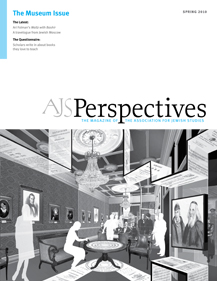Dear Colleagues,
We begin our editorship of AJS Perspectives at a time when Jewish Studies is an established and thriving field, one that continues the long tradition of Jewish textual study and advances new intellectual paradigms. We approach the editorship as partners: one of us works on antiquity and the other on the modern period, one of us is from Jewish Vienna and the other from Jewish Detroit. Our commitment rests on a vision of Jewish Studies that, true to the title of the magazine, incorporates a range of perspectives. We look forward to dialogue and collaboration with one another and with all our colleagues and hope that Perspectives will reflect the breadth and dynamism of Jewish Studies in the twenty-first century. We thank our teachers and mentors who have set the tone of Jewish academic discourse and extend our deep gratitude to Steve Fine, Riv-Ellen Prell, and Allan Arkush for envisioning and creating Perspectives as a forum. In continuation of their tradition, every issue of Perspectives will focus on a central theme.
Our first issue revolves around the theme of Jewish museums and the many roles that these museums can play. Jewish museums are opening and expanding nationally and internationally and, despite their different missions, confront some of the same challenges. Many of the museums visited in this issue showcase the primacy of memory in Jewish culture; others point toward events not publicly remembered in Jewish settings. The current academic engagement with museums reflects how Jewish Studies is increasingly moving beyond the academy. The articles in this issue discuss the conception, design, and engagement with museums by scholars of Jewish Studies and present ways of using museums as subjects of research and teaching. While we have hardly exhausted the theme, we have tried to look at it in a global fashion.
Although we are continuing the Perspectives tradition of a central theme, we are also introducing two new features. "The Latest" offers articles about contemporary Jewish cultural production, and a questionnaire surveys the views of our colleagues on particular topics. Our first questionnaire explores favorite books for teaching Jewish Studies to undergraduate students. We hope that you will read, enjoy, and debate this issue as well as our subsequent issues of Perspectives.
Matti Bunzl
University of Illinois at Urbana-Champaign
Rachel Havrelock
University of Illinois at Chicago

